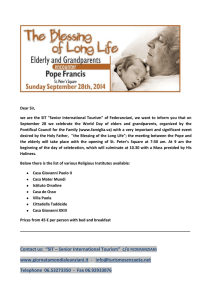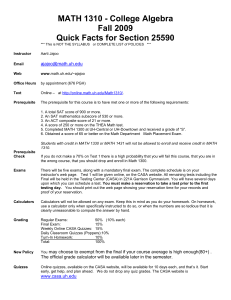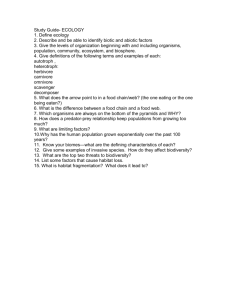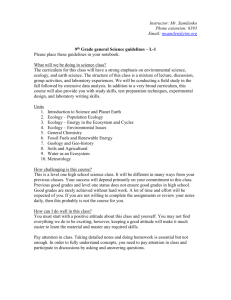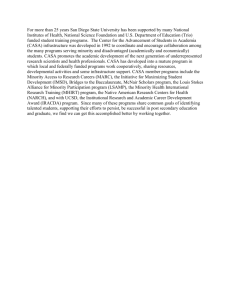2013 Ecology syllabus - University of Houston
advertisement
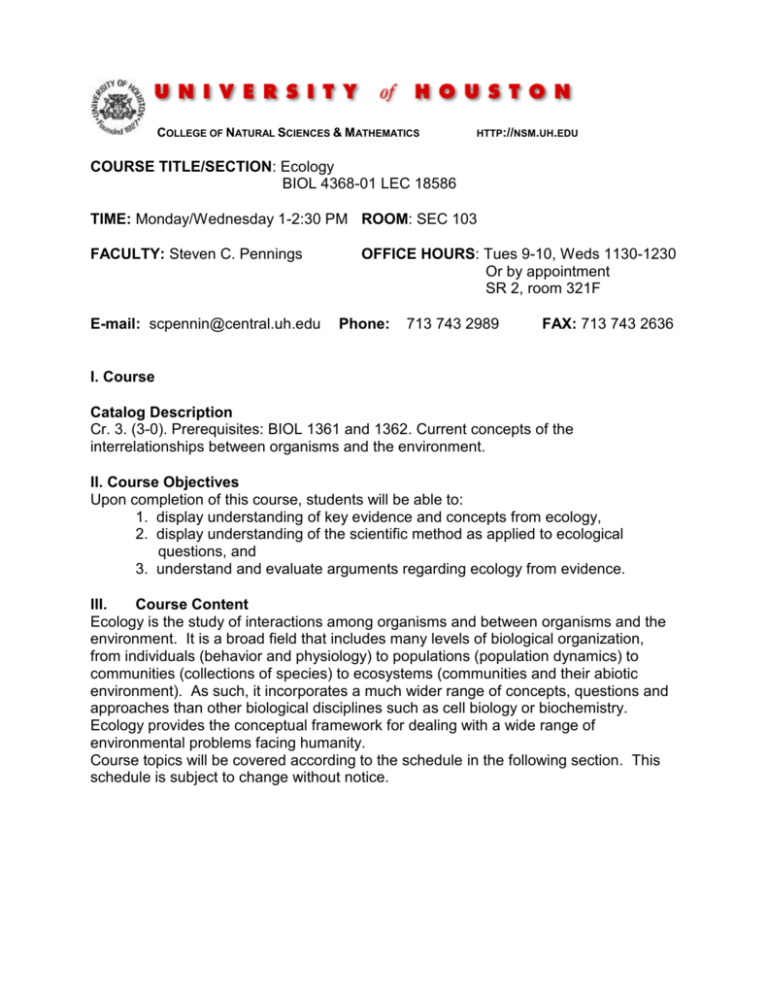
COLLEGE OF NATURAL SCIENCES & MATHEMATICS HTTP://NSM.UH.EDU COURSE TITLE/SECTION: Ecology BIOL 4368-01 LEC 18586 TIME: Monday/Wednesday 1-2:30 PM ROOM: SEC 103 FACULTY: Steven C. Pennings E-mail: scpennin@central.uh.edu OFFICE HOURS: Tues 9-10, Weds 1130-1230 Or by appointment SR 2, room 321F Phone: 713 743 2989 FAX: 713 743 2636 I. Course Catalog Description Cr. 3. (3-0). Prerequisites: BIOL 1361 and 1362. Current concepts of the interrelationships between organisms and the environment. II. Course Objectives Upon completion of this course, students will be able to: 1. display understanding of key evidence and concepts from ecology, 2. display understanding of the scientific method as applied to ecological questions, and 3. understand and evaluate arguments regarding ecology from evidence. III. Course Content Ecology is the study of interactions among organisms and between organisms and the environment. It is a broad field that includes many levels of biological organization, from individuals (behavior and physiology) to populations (population dynamics) to communities (collections of species) to ecosystems (communities and their abiotic environment). As such, it incorporates a much wider range of concepts, questions and approaches than other biological disciplines such as cell biology or biochemistry. Ecology provides the conceptual framework for dealing with a wide range of environmental problems facing humanity. Course topics will be covered according to the schedule in the following section. This schedule is subject to change without notice. IV. Course Structure Date January 14 Topic 1. Introduction Unit 1-Organisms and their environment January 16 2. The physical environment January 21 Holiday January 23 3. The biosphere January 28 4. Environmental variation-temperature and water January 30 5. Environmental variation-energy Unit 2-Populations February 4 February 6, 7 February 11 February 13 February 18 6. Life history First exam (at CASA), lectures 1-6 7. Population distribution and abundance 8. Population growth and regulation 9. Population dynamics Unit 3-Interactions among organisms February 20 10. Competition February 25 11. Predation February 27 12. Herbivory March 4, 5 Second exam (at CASA), lectures 7-12 March 6 13. Parasitism March 11, 13 Spring holiday Unit 4-Communities March 18 14. Mutualism and commensalism March 20 15. The nature of communities March 25 16. Change in communities March 27 17. Biogeography April 1 18. Species diversity April 3, 4 Third exam (at CASA), lectures 13-18 Unit 5-Ecosystems April 8 19. Production April 10 20. Energy flow and food webs April 15 21. Nutrient supply and cycling Unit 6-Applied and large scale ecology April 17 22. Conservation biology April 22 23. Landscape ecology and ecosystem management April 24 24. Global ecology April 29, 30 Fourth exam (at CASA), lectures 19-24 Important drop dates. January 30: last day to drop or withdraw without a grade. March 27: last day to drop or withdraw with a “W”. V. Textbooks There will not be a formal textbook for this course. If you want a textbook for use as a reference, get an inexpensive used text. Texts by Cain, Krebs, Miller, Ricklefs, and Stiling are all fine. The syllabus will be posted online at www.bchs.uh.edu/~steve/. Other course material will be available through blackboard (www.uh.edu/blackboard/). VI. Course Requirements A. Reading Assignments. You will be expected to do some preparatory reading in order to prepare for each lecture (assignments will be posted on blackboard). You will need access to the internet in order to complete these assignments. You are responsible for all material in the assignments, even if it is not covered in the lectures. B. Exams. Exams will include material covered in pre-lecture assignments and in lectures. The exams will focus on the most recent sections of the course, but will build on material covered in earlier sections. Exams will be taken at CASA (www.casa.uh.edu/casa) outside of class hours. Each exam will have 30-40 multiple choice questions; you will have 2 hours to complete exams. It is your responsibility to schedule your exam time at CASA. If an emergency or conflict forces you to miss an exam, discuss this with Dr. Pennings as soon as possible (if possible, before the exam) and provide him with documentation of the emergency or conflict. VII. Evaluation and Grading Your lowest exam score will be dropped. You will be graded on the remaining three exams (each 100 pts). In addition, you will be asked one or more oral question in class (15 points). Grades will be assigned based on a curve based on a total possible of 315 pts. Policy on grades of I (Incomplete): At the discretion of Dr. Pennings, you may receive an incomplete if unexpected events such as a major illness or a death in the family prevent you from finishing the course work on time. Discuss your situation with Dr. Pennings as early as possible. Addendum: Whenever possible, and in accordance with 504/ADA guidelines, the University of Houston will attempt to provide reasonable academic accommodations to students who request and require them. Please call 713-743-5400 for more assistance.
